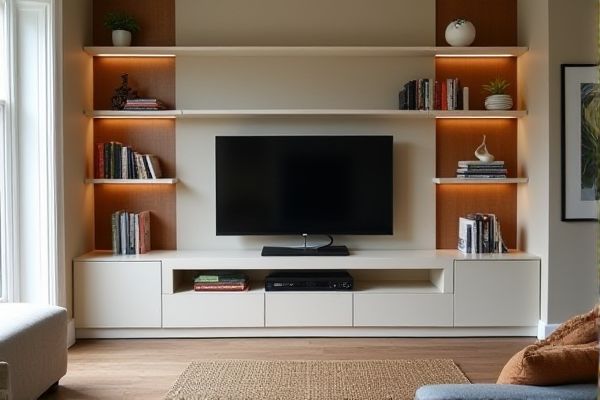
An entertainment center offers extensive storage and display options tailored for various electronics and decor, while a media console focuses on a sleek, minimalist design primarily for housing media devices like TVs and gaming consoles. Discover key differences and find the perfect fit for your living space by exploring the rest of this article.
Table of Comparison
| Feature | Entertainment Center | Media Console |
|---|---|---|
| Size | Large, bulky, occupies significant space | Compact, space-efficient |
| Storage Capacity | Multiple shelves, cabinets for devices, DVDs, and decor | Limited shelving, designed mainly for media devices |
| Design | Traditional, often ornate | Modern, sleek, minimalist |
| Functionality | Stores TV, audio systems, gaming consoles, accessories | Holds TV and essential media devices primarily |
| Price | Generally higher due to size and storage | Usually more affordable |
| Best For | Homes needing extensive storage and display | Small spaces and minimalist setups |
Definition of Entertainment Center
An entertainment center is a large, multifunctional furniture unit designed to house a television, audio equipment, gaming consoles, and provide ample storage for DVDs, books, and decorative items. Unlike a media console, which is typically smaller and primarily supports the TV and media devices, an entertainment center offers extensive compartments, shelves, and cabinets to organize various electronics and accessories in one place. Your choice depends on the space available and the level of storage and organization you require for your home entertainment setup.
Definition of Media Console
A media console is a piece of furniture specifically designed to house electronic devices like TVs, gaming consoles, and audio equipment, often featuring shelves and compartments for organized storage. Entertainment centers are typically larger units that combine a media console with additional storage and display options, sometimes including cabinets and space for decorative items. Choosing the right media console enhances your space by neatly concealing wires and supporting your entertainment setup efficiently.
Design Differences: Entertainment Center vs Media Console
Entertainment centers typically feature a larger, more complex design with multiple compartments, shelves, and cabinets to accommodate a variety of devices and accessories, including TVs, gaming consoles, speakers, and media players. Media consoles focus on a minimalist aesthetic, often with low-profile, sleek designs optimized primarily for housing TVs and limited media components. The structural difference centers on functionality and space, with entertainment centers offering extensive storage and media consoles emphasizing compactness and streamlined looks.
Storage Capacity Comparison
Entertainment centers typically offer greater storage capacity with multiple shelves, cabinets, and compartments designed to house various electronic devices, DVDs, books, and decorative items. Media consoles usually provide a more compact storage solution with fewer compartments, often emphasizing sleek design over extensive storage space. The choice between the two depends on the need for expansive storage versus a minimalist, space-saving approach.
Space Requirements and Room Placement
Entertainment centers typically require more floor space and can dominate a room due to their larger dimensions and storage components, making them suitable for spacious living rooms or family rooms. Media consoles are more compact and versatile, ideal for smaller spaces or rooms where minimalism and streamlined aesthetics are preferred. Proper room placement for entertainment centers often involves a central wall to accommodate wiring and accessibility, while media consoles can be positioned in various locations, including corners or beneath wall-mounted TVs.
Aesthetic Appeal and Style Options
Entertainment centers offer a more comprehensive and traditional aesthetic with built-in shelves and cabinetry, creating a unified focal point in your living space. Media consoles provide a sleek, minimalist style that easily adapts to modern or contemporary decor, often featuring clean lines and open storage. Your choice depends on whether you prefer a statement piece that organizes multiple media components or a versatile, streamlined unit that complements your room's design.
Functionality and Device Compatibility
Entertainment centers offer extensive storage options and accommodate larger devices, making them ideal for housing multiple components like gaming consoles, speakers, and DVD players. Media consoles provide a sleek and compact design, focusing on compatibility with flat-screen TVs and essential media devices, helping you optimize space without sacrificing device functionality. Choosing between the two depends on your entertainment setup's size and the variety of devices you need to integrate.
Installation and Assembly Considerations
Entertainment centers often require more complex installation and assembly due to their larger size and integrated shelving, which may need multiple tools and more time. Media consoles typically offer simpler assembly with fewer components, making them easier for you to set up quickly. Choosing between the two depends on your available space and willingness to invest effort in installation.
Price Range and Budget Factors
Entertainment centers typically range from $200 to $1,200, offering more storage and design features but at a higher price point compared to media consoles, which usually cost between $100 and $600. Budget factors include available space, material quality, and the need for added functionality like shelving or cable management. Choosing a media console can be more cost-effective for minimalist setups, while entertainment centers suit larger budgets and extensive media collections.
Choosing the Best Option for Your Home
Choosing the best option for your home depends on space, functionality, and style preferences. An entertainment center offers ample storage and display features, ideal for organizing multiple devices, decor, and media collections. A media console provides a sleek, minimalist solution perfect for smaller spaces, focusing on housing essential electronics while maintaining a clean, modern look for your living area.
 homyna.com
homyna.com